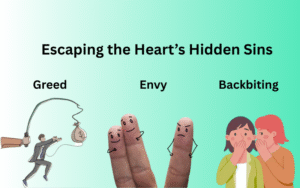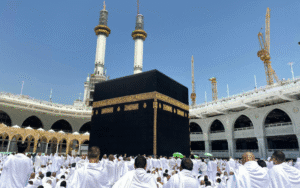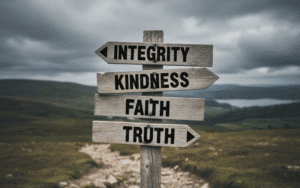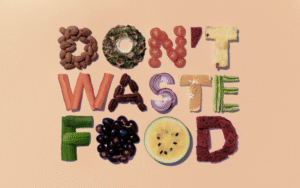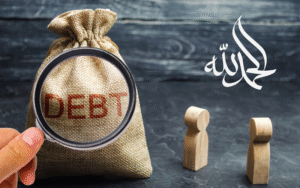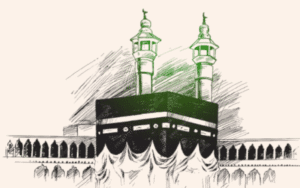The Shocking Consequences of Oppression in Islam
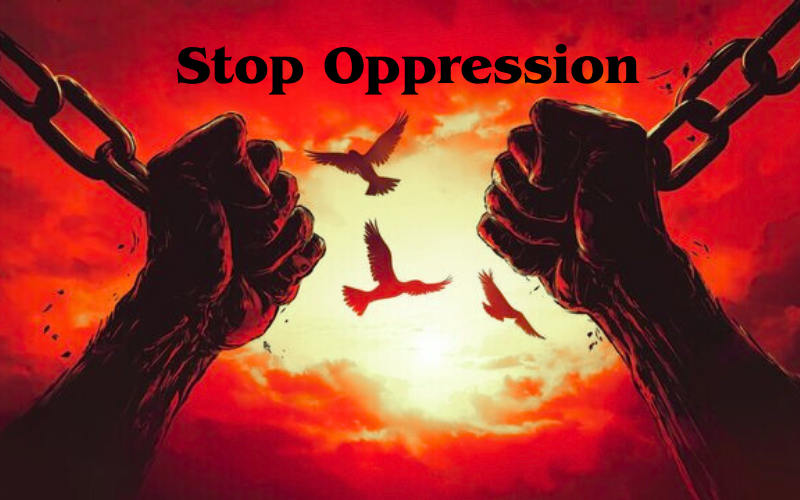
In the eyes of God, humanity is a unique and honored creation. The human race originated from our first parents, Adam and Eve. As Allah states:
يَا أَيُّهَا النَّاسُ اتَّقُوا رَبَّكُمُ الَّذِي خَلَقَكُمْ مِنْ نَفْسٍ وَاحِدَةٍ
“O mankind, fear your Lord, who created you from one soul…”
(Surah An-Nisa, 4:1)
By this standard, every human being is a brother or sister to another. Ideologically, Muslims are also descendants of the tradition of Abraham (peace be upon him). Allah says:
مِلَّةَ أَبِيكُمْ إِبْرَاهِيمَ هُوَ سَمَّاكُمُ الْمُسْلِمِينَ
“[It is] the religion of your father, Abraham. He [Allah] named you Muslims…”
(Surah Al-Hajj, 22:78)
Therefore, whether viewed through lineage or faith, a deep bond exists among all people. To disrespect this sacred bond is a grievous offense, and the concept of Oppression in Islam is treated with the utmost severity, as its consequences are not limited to this life but demand a severe reckoning in the Hereafter.
God’s Clear Prohibition Against Harm
Islam strictly forbids causing any form of harm to people. In fact, the Holy Quran specifically warns against causing harm to any believing individual without reason:
وَالَّذِينَ يُؤْذُونَ الْمُؤْمِنِينَ وَالْمُؤْمِنَاتِ بِغَيْرِ مَا اكْتَسَبُوا فَقَدِ احْتَمَلُوا بُهْتَانًا وَإِثْمًا مُبِينًا
“And those who harm believing men and believing women for [something] other than what they have earned have certainly borne a slander and a clear sin.”
(Surah Al-Ahzab, 33:58)
This verse makes it clear that even the slightest injustice is a major sin in the sight of Allah. In a similar vein, the Prophet Muhammad ﷺ gave an even more stern warning:
“O you who have accepted Islam with your tongues, but in whose hearts faith has not yet entered! Do not harm the Muslims, do not shame them, and do not seek out their faults. For whoever seeks out the faults of his Muslim brother, Allah will seek out his faults. And if Allah seeks out a person’s faults, He will expose him, even if he is in the privacy of his own home.”
(Tirmidhi, Hadith 2032)
Causing Harm Through Words
Words can inflict wounds deeper and more lasting than any blade. Consequently, Islam provides detailed guidance on guarding one’s tongue. Below are some of the primary ways people cause pain through speech.
1. Slander and Insults: To curse or insult a Muslim is considered a major sin. For instance, the Prophet ﷺ said,
“Insulting a Muslim is a grave transgression (Fisq), and fighting him is an act of disbelief (Kufr).”
(Bukhari, Hadith 6044)
2. Backbiting (Gheebah) and Slander (Tohmat): Backbiting means to speak about someone in their absence in a way they would dislike. To illustrate its severity, Allah compares this act to cannibalism:
وَلَا يَغْتَبْ بَعْضُكُمْ بَعْضًا أَيُحِبُّ أَحَدُكُمْ أَنْ يَأْكُلَ لَحْمَ أَخِيهِ مَيْتًا فَكَرِهْتُمُوهُ
“…And do not backbite each other. Would one of you like to eat the flesh of his dead brother? You would hate it…”
(Surah Al-Hujurat, 49:12)
3. Tale-Bearing (Namimah) and Sowing Discord: This refers to carrying tales between people with the express purpose of ruining their relationships. Regarding this, the Prophet ﷺ said,
“The worst of Allah’s servants are those who go about with slander, causing division between friends.”
(Ahmad, Hadith 17998)
4. Mockery and Offensive Nicknames: Mocking others or calling them by hurtful nicknames is a direct attack on their God-given dignity. For this reason, Allah commands:
يَا أَيُّهَا الَّذِينَ آمَنُوا لَا يَسْخَرْ قَوْمٌ مِنْ قَوْمٍ عَسَىٰ أَنْ يَكُونُوا خَيْرًا مِنْهُمْ وَلَا نِسَاءٌ مِنْ نِسَاءٍ عَسَىٰ أَنْ يَكُنَّ خَيْرًا مِنْهُنَّ
“O you who have believed, let not a people ridicule [another] people; perhaps they may be better than them. Nor let women ridicule [other] women; perhaps they may be better than them…”
(Surah Al-Hujurat, 49:11)
In the same verse, He adds, “…And do not insult one another with nicknames.” (Surah Al-Hujurat, 49:11)
5. Belittling Others: Looking down on another human being is a sign of profound arrogance. Indeed, the Prophet ﷺ said,
“It is sufficient evil for a person to despise his Muslim brother.”
(Muslim, Hadith 2564)
6. Cursing: Cursing is explicitly not a trait of a believer. The Prophet ﷺ went so far as to say,
“Cursing a believer is like murdering him.”
(Bukhari, Hadith 6105).
Moreover, he warned that if the person who is cursed does not deserve it, the curse inevitably returns upon the one who uttered it
(Abu Dawood, Hadith 4905).
7. Suspicion and Assuming the Worst: The human heart is sensitive, and baseless suspicion can cause deep wounds. Therefore, a believer’s duty is to think the best of others. Allah advises:
يَا أَيُّهَا الَّذِينَ آمَنُوا اجْتَنِبُوا كَثِيرًا مِنَ الظَّنِّ إِنَّ بَعْضَ الظَّنِّ إِثْمٌ
“O you who have believed, avoid much [negative] assumption. Indeed, some assumption is sin…”
(Surah Al-Hujurat, 49:12)
The Prophet ﷺ himself set the best example. Once, while in seclusion in the mosque (i’tikaf), he was speaking with his wife, Safiyyah. When two companions saw them and hurried away, the Prophet ﷺ stopped them and clarified, “This is my wife, Safiyyah,” specifically to prevent Satan from planting any doubt in their hearts.
(Bukhari, Hadith 2035)
8. Reminding of Favors: While giving charity is an act of worship, reminding someone of that charity turns it into an act of arrogance. This action not only wounds the recipient’s dignity but also completely destroys the reward for the giver. Allah warns:
يَا أَيُّهَا الَّذِينَ آمَنُوا لَا تُبْطِلُوا صَدَقَاتِكُمْ بِالْمَنِّ وَالْأَذَىٰ
“O you who have believed, do not invalidate your charities with reminders of your generosity or with injury…”
(Surah Al-Baqarah, 2:264)
Similarly, the Prophet Muhammad ﷺ mentioned three people to whom Allah will not speak on the Day of Judgment, one of whom is “one who reminds others of his favors.”
(Muslim, Hadith 106)
Causing Harm Through Actions
Beyond verbal harm, Islam also strictly forbids physical and material transgressions. These actions often have immediate and devastating worldly consequences.
1. Oppression in Islam (Zulm)
Oppression isn’t just physical abuse; rather, it encompasses all forms of injustice, wrongdoing, and denial of rights. Failing to give someone their due, showing favoritism, or abusing power are all forms of oppression. In a profound Hadith Qudsi, Allah states:
يَا عِبَادِي إِنِّي حَرَّمْتُ الظُّلْمَ عَلَىٰ نَفْسِي وَجَعَلْتُهُ بَيْنَكُمْ مُحَرَّمًا فَلَا تَظَالَمُوا
“O My servants, I have forbidden oppression for Myself, and I have made it forbidden among you, so do not oppress one another.”
(Muslim, Hadith 2577)
Crucially, the prayer of an oppressed person reaches Allah directly. The Prophet ﷺ warned,
“Beware of the supplication of the oppressed, for there is no veil between it and Allah.”
(Bukhari, Hadith 1496)
2. Deception and Fraud: Hiding defects in a product, giving less in weight or measure, or neglecting one’s duties are all acts of deception. For example, the Prophet ﷺ once passed by a pile of grain in the market, and upon putting his hand inside, he felt dampness. He then declared,
“Whoever deceives is not of us.”
(Muslim, Hadith 102)
3. Seeking Faults: Forgetting one’s own flaws to search for the flaws of others is a terrible habit. For this reason, the Prophet ﷺ warned sternly,
“Whoever seeks out the faults of others, Allah will seek out his faults. And if Allah seeks out a person’s faults, He will expose him, even if he is in the privacy of his own home.”
(Tirmidhi, Hadith 2032)
4. Enmity: Believers are meant to be brothers and sisters, yet creating hostility between them is the work of Satan. The Prophet ﷺ beautifully illustrated this bond, saying,
“The believers in their mutual kindness, compassion, and sympathy are just like one body. When one of the limbs suffers, the whole body responds to it with wakefulness and fever.”
(Muslim, Hadith 2585)
5. Blocking Paths: Obstructing a public path, whether in protest or out of personal spite, is a harmful act. In contrast, removing a harmful object from the road is so virtuous that it is considered a branch of faith. (Muslim, Hadith 35)
6. Usurping Property: Unlawfully seizing someone’s wealth or land is a grave crime. This act is a clear and direct example of Oppression in Islam, with devastating consequences in the hereafter. Allah states plainly:
وَلَا تَأْكُلُوا أَمْوَالَكُمْ بَيْنَكُمْ بِالْبَاطِلِ
“And do not consume one another’s wealth unjustly…”
(Surah Al-Baqarah, 2:188)
Regarding its punishment, the Prophet ﷺ said,
“Whoever usurps a handspan of land unjustly will have it hung around his neck from the seven earths on the Day of Judgment.”
(Bukhari, Hadith 3198)
7. Murder: The ultimate form of harm is to take a life. This crime, of course, devastates not just the victim but their entire family and community. In the Quran, Allah equates the unjust killing of one person to the killing of all humanity:
مَنْ قَتَلَ نَفْسًا بِغَيْرِ نَفْسٍ أَوْ فَسَادٍ فِي الْأَرْضِ فَكَأَنَّمَا قَتَلَ النَّاسَ جَمِيعًا وَمَنْ أَحْيَاهَا فَكَأَنَّمَا أَحْيَا النَّاسَ جَمِيعًا
“…Whoever kills a soul unless for a soul or for corruption [done] in the land – it is as if he had slain mankind entirely. And whoever saves one – it is as if he had saved mankind entirely.”
(Surah Al-Ma’idah, 5:32)
Conclusion
In summary, whether through a slip of the tongue or a transgression of the hand, harming another person is a horrific crime. It not only damages social bonds but also severely harms one’s relationship with God. Ultimately, sins related to the rights of other people will not be forgiven by Allah until the people themselves forgive. The detailed teachings against Oppression in Islam are a constant reminder that on the Day of Judgment, we must all fear a moment when our good deeds are depleted to pay off the debts we owe to those we have wronged.
May Allah make our tongues, hands, and hearts a source of peace for others, and may He protect us from all forms of injustice. Ameen!
Frequently Asked Questions
What is the Islamic view on harming others?
Islam strictly forbids causing any form of harm to people, whether through words or actions. The Quran and Hadith contain clear warnings against injustice and harming believing men and women without reason.
What are some examples of causing harm through words?
The article identifies several ways people can cause harm with their words, including:
- Slander and insults
- Backbiting and tale-bearing
- Mockery and offensive nicknames
- Belittling others
- Cursing
- Suspicion and assuming the worst
- Reminding others of favors given
How does Islam view backbiting?
Islam considers backbiting, which is speaking about someone in their absence in a way they would dislike, to be so severe that Allah compares it to eating the flesh of one's dead brother.
What are some examples of causing harm through actions?
The article lists several harmful actions that are forbidden in Islam, such as:
- Oppression (Zulm), which includes all forms of injustice.
- Deception and fraud.
- Seeking out the faults of others.
- Creating enmity between people.
- Blocking public paths.
- Unlawfully taking someone's property.
- Murder.
What are the consequences of oppression?
Oppression is forbidden by Allah. The prayer of an oppressed person is said to reach Allah directly without any veil, and sins related to the rights of other people will not be forgiven by Allah until those people themselves forgive.
